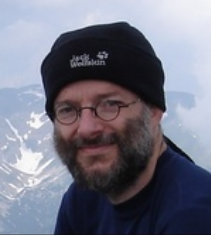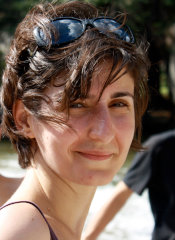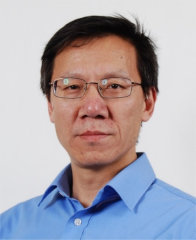Thomas Villmann - University of Applied Sciences Mittweida
Talk: LVQ - from a heuristic classifier to a family of mathematically well-defined interpretable models for classification learning

|
Prof. Thomas Villmann is with the University of Applied Sciences Mittweida (UASM), Germany. He holds a diploma degree in Mathematics, received his Ph.D. in Computer Science in 1996 and his habilitation as well as venia legendi in the same subject in 2005, all from the University of Leipzig, Germany. From 1997 to 2009 he led the computational intelligence group of the hospital for psychotherapy at Leipzig University. In 2006 he was visiting professor at the University Paris Panthéon-Sorbonne in the dpeartment for statistical analysis and mathematical modelling (SAMM). Since 2009 he is a full professor for Technomathematics/ Computational Intelligence at the UASM (Saxony), Germany. He is founding member of the German chapter of European Neural Network Society (GNNS) and its president since 2011. Further he leads the Institute of Computational Intelligence and Intelligent Data Analysis e.V. in Mittweida, Germany and the Computational Intelligence Group at the University of Applied Sciences Mittweida. Since 2017 he is director of the Saxony Institute for Computational Intelligence and Machine Learning (SICIM) at the UASM. Prof. Villmann published more than 90 articles in leading journals. He authored and co-authored more than 250 conference papers and book chapters. Under his supervision, 12 PhD completitions were achieved, three more anticipated this year. He is editor in chief of the Machine Learning Reports (MLR) and acts as an associate editor for Neural Processing Letters and for Computational Intelligence and Neuroscience. His research focus includes the theory of prototype based clustering and classification, non-standard metrics, information theoretic and similarity based learning, quantum-enhanced machine learning, interpretable models in machine learning, statistical data analysis and their application in pattern recognition, data mining and knowledge discovery for use in medicine, bioinformatics, remote sensing, hyperspectral analysis and others. Personally, he is an alpinist and likes climbing in high altitudes. Futher, he is active in judo since more than 40 years. |
Madalina Olteanu - CEREMADE, Paris Dauphine PSL
Talk: R-SOMbrero for SOM visualisation

|
Madalina Olteanu is a Professor of Applied Statistics and Data Science in Paris Dauphine University PSL, and member of CEREMADE research team.
She received a PhD in Applied Mathematics from Panthéon Sorbonne University in 2006, where she was also appointed Assistant Professor until 2020.
She authored or co-authored more than fifty papers in international journals or peer-reviewed proceedings.
Her research interests are mainly focused on the study of time and temporalities in complex data, and particularly in humanities and social sciences.
The techniques she uses and investigates are related to time series analysis, Markov-switching models, supervised and unsupervised learning, and self-organising maps.
|
Jean-Charles Lamirel - University of Strasbourg (France) & University of Dalian (China)
Talk: Different variations of gases of neurons including growing gases and their application

|
Dr. Habil. Jean-Charles Lamirel is both lecturer since 1997 and invited Sea-Sky Full Professor at DUT ‑ University of Dalian, China, since 2016. He got his PhD in 1995 and his Research Accreditation in 2010. He is currently teaching Information Science and Computer Science at the University of Strasbourg. His main domains of research are Machine Learning Models, Neural Networks, Textual Data Mining, Scientometrics and Social Networks analysis. He is the creator of the paradigms of Data Analysis based on Multiple Viewpoints and Metric based on Feature Maximization. The related models for which it has been proven that they outperform classical models are now used in many challenging Data Mining applications. His work generated an important scientific production: more than 45 invited conferences, PC member of more than 60 international conferences, organizer of 4 international conferences and of more than 18 special sessions in international conferences, editor of special issues in international journals and main author of more than 160 publications in international conferences and journals. |
Hujun Yin - The University of Manchester
Talk: SOM’s Relationship with Manifold and Deep Features

|
Prof. Hujun Yin is a Professor of Artificial Intelligence at the University of Manchester. He is also the head of Business Engagement in AI and Data for the Faculty of Science and Engineering. His research areas include AI, machine learning, deep learning, signal/image processing, pattern recognition, time series modelling, bio-/neuro-informatics, and interdisciplinary applications. He has supervised over twenty PhD students and published over 200 peer-reviewed articles. Prof. Yin has received over £4 million research funding from UK research councils, EPSRC, BBSRC, Innovate UK and industries across 25 funded projects. Many of his projects involve local industries and SMEs in developing cutting edge AI solutions. He has served or has been serving as an Associate Editor for the IEEE Transactions on Neural Networks, the IEEE Transactions on Cybernetics, and the International Journal of Neural Systems. He has also served as the General Chair or Programme Chair for a number of international conferences in AI, machine learning and data analytics. He is a member of the EPSRC Peer Review College (since 2006), a senior member of the IEEE (since 2003) and a Turing Fellow of the Alan Turing Institute (since 2018). |
